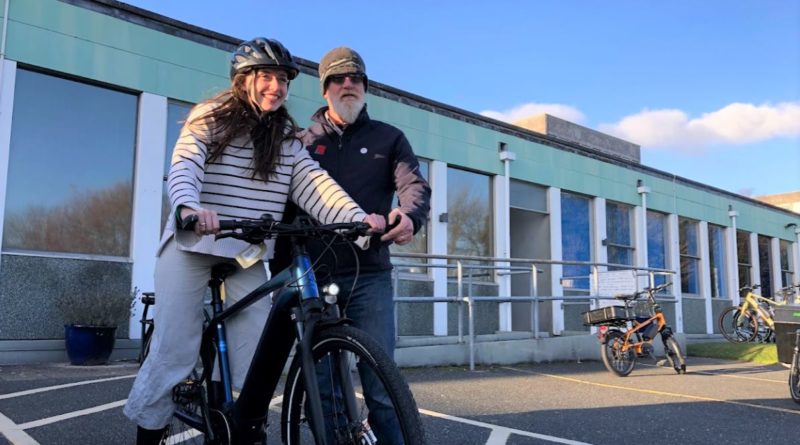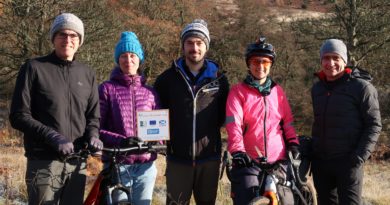E-cycle pilot scheme rolling in South West ahead of national scheme
England’s e-cycle pilot scheme has reached full flight in Cornwall, in a year-long demonstration programme that will go on to inform a national e-cycle support scheme. Laura Laker reports…
Wheels to Work South West, a Cornwall-based employment mobility charity, is running the £400,000 pilot with 90 electric cycles across three different e-cycle loan elements: a public ‘roadshow’ for the public, ‘opportunities to try’ for business transport, and ‘access to employment’ – the same three elements expected from a national scheme.
The pilot, which was announced during the G7 summit in Cornwall last summer, along with investment in new walking and cycling routes, is intended to help Cornish residents switch away from cars, while providing cost-effective transport for low-income households to access employment and other opportunities.
Max Jowett, CEO of Wheels to Work South West, a Charitable Incorporated Organisation, says while the announcement was made last June, and the pilot officially began in September, when the first cycles were loaned out, full setup has taken time, partly due to supply issues. Once the advertising campaign launched in January he had “18 enquiries within 24 hours”, from residents and businesses.
He said: “The take up is accelerating rapidly and the general feel is that it’s been long awaited.” The charity is using 50 e-cycles for the access to employment element, 28 for opportunity to try, and 12 for roadshows. However, he expresses concerns that the pilot officially ends this June and “you’ve got 3-4 months to get rolling, when we really should be piloting this for 3-4 years”.
Jowett has 21 years’ charity experience loaning mopeds to people on low incomes and supporting them to save and buy their own transport – an element that will be mirrored in the e-cycle pilot. The commission to run the pilot came about because, he says: “I worked with the DfT some years back, they contacted me to ask advice about the program. I then started working with them to develop the national program. They then asked me to run the Cornwall pilot”.
“The DfT want this to reach people from all walks of life but primarily they want to target their investment to the most needy”.
The access to employment element of the scheme loans cycles to participants for six months. He says the impact is “massive, it’s lifechanging, but it’s lifechanging for families, too: if you have a young person living in a rural area, with parents running them around, when you give them independent transport, whatever that be, you free up the family as well. You give them freedom, independence and choice.
“Sometimes people name their bikes after biblical characters because it changes their lives so much.”
Jowett and colleagues are taking a variety of e-cycles to 25 to 30 ‘roadshows’ in the county, from the Tour of Britain when it visited Cornwall in September, to local shows and even the Eden Project, where people can try e-cycles on the spot. This, Jowett says, is a case of “set up and allow people to have a go. It’s a nice side of it, and it’s relatively simple to deliver”.
He said: “People are extremely interested, which is encouraging. At each roadshow we get people who say ‘I’m going to buy one but I don’t know what to buy’. They ask us where to get them, so we promote local business where they can buy one. It’s about information sharing, we’re not selling bikes. We were supported by one retailer and sold one at a roadshow, when people say ‘this is for me’.”
He said event participants fill in a digital form on a tablet, feeding data back to the Department for Transport via University of the West of England (UWE) in Bristol.
The ‘opportunity to try’ element is aimed at business travel, with cycles loaned to organisations for a month or two while staff understand e-cycles and how they might use them. To date cycles have been loaned to local police forces, doctors’ surgeries and hospitals, as well as local retailers.
Jowett says: “One doctors’ surgery in St Austell has three for its community workers; they plan to buy some, so they’re trying a selection so they know what kind they might want. Before they make that investment, because it’s expensive – it might be £9,000-10,000 for three bikes – they want to make sure they’re putting their money in the right place.”
Trialling cycles at workplaces also allows staff to think about purchasing e-cycles themselves. He says: “Take a doctor’s surgery, they’re busy people doing massively important work. They don’t have time to go out and trial e-bikes, so we’re facilitating them trying some. These are people that can afford to buy bikes so they only need a short time to establish what their needs and wants are, to apply a new transport to their daily commute before they make a significant investment.”
He also ran an event at a Truro hospital after the local council introduced several Low Traffic Neighbourhoods (LTNs) on local roads.
“There’s been significant interest from the doctors and nurses, to see ‘is an e-bike going to make my life easier?’” he said. “They’ve been forced to rethink how they get around.”
Other pilot participants include a local ice cream business, with multiple sites in a town where parking is limited, particularly in peak season. Jowett says previously staff had to park two miles out of town, meaning long journeys to shift staff and goods. “In the summer you can’t move [in a car] and the electric bike allows them to move between ice cream shops and the towns,” he says. “So far everyone is finding the whole program very exciting and the bikes are running smoothly.”
Devon and Cornwall police borrowed four e-cycles in September, with some staff using them to commute to work, and others using them for patrols during the day. “They don’t want to give them back,” says Jowett, “they’re fantastic for them. They’re dual-purpose off-road Giant Explore bikes. They were quite smart and the right colour, dark blue, and they loved them. It means the PCSOs aren’t having to walk everywhere.”
“Of course, with the development of infrastructure and car-free roads it’s going to be a much more pleasant experience,” he adds.
“Pivotal is it’s cheaper, you’ve got no parking costs, you’re not stuck in traffic, it costs 5-10p to charge an e-bike, you get 30 miles on that. It’s going to save money and we might even save the world”.
Wheels to Work is among those who have submitted bids to run the national e-cycle scheme. Local Authorities were last week awarded a handful of grants for electric bike schemes as part of bids to tackle air pollution.



